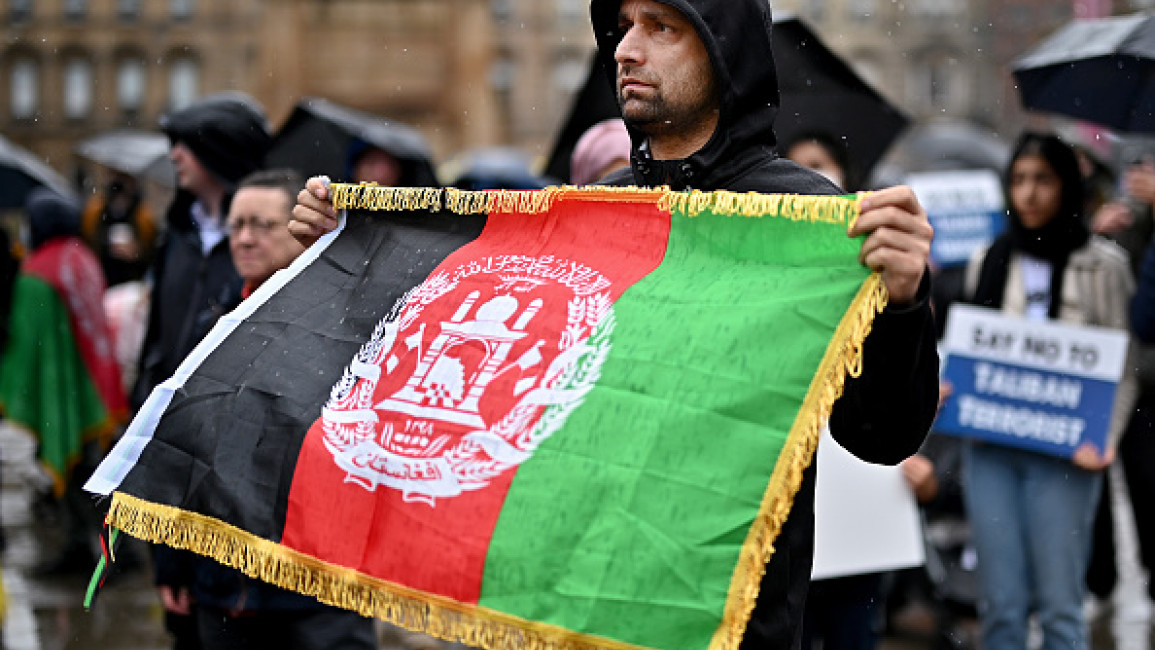Not giving up: Afghan relatives in UK reach out for help
For people with family members trying to get out of Afghanistan, recent days have brought a frantic mix of fear and frustration.
In west London, many relatives are doing what they can: seeking advice and information from the Afghanistan & Central Asian Association. The organization was set up to support refugees 20 years ago, the same year a US-led international force drove the Taliban from power after the 9/11 attacks.
Shah Hamdam, 52, said he would do anything to get his sister, a television journalist, out of Kabul, now that the Taliban are back in control of Afghanistan.
“She is begging," Hamdam said Friday. "She says, ‘Find a solution, find a way for me to get out of this situation at the moment.’ I try, I try, I knock every door to find a way to bring her over if possible.”
With the US still planning to have all its troops withdrawn from Afghanistan by Aug. 31, there's a mad scramble to get out — and a corresponding sense of dread among Afghan families already abroad. Crowds of people clutching documents and sometimes stunned-looking children were outside the gates of the international airport in Kabul on Saturday, blocked by coils of razor wire.
Relatives of the ones who don't make it on a flight out will be hoping that the Taliban prove true to their word and do not target those who assisted Western troops over the past 20 years.
Nilufar Nasrti, 47, is worried about her family because some members worked for the Afghan government. They are afraid to sleep at night, she said.
“Dangerous," Nasrti said from London. “If the Taliban will come into the house, they will kill you.”
Like other nations, Britain is trying to evacuate Afghan allies as well as its own nationals from Afghanistan, but with the US-imposed deadline hovering into view, it's a race against time. In addition to the 4,000 or so UK nationals, there are thought to be around 5,000 Afghan allies, such as translators and drivers, who are earmarked for a seat on a plane.
As of Wednesday, Britain had managed to get out over 2,000 Afghans from the country, way more than the 300 or so UK nationals. Since then, Prime Minister Boris Johnson says the UK government has evacuated around 1,000 people a day, a lot of them Afghan citizens “to whom we owe debts of gratitude and honour.”
The government has also announced what it terms a “generous” refugee settlement program that would allow up to 20,000 vulnerable Afghans, primarily women and children, to seek sanctuary in the UK in the next few years, including 5,000 this year. The total for this year is in addition to the Afghan allies Britain is trying to evacuate now.
Critics argue that the plan is not bold enough and does not come close to matching Britain’s share of the responsibility.
Dr Nooralhaq Nasimi, founder and director of the Afghanistan & Central Asian Association, is one of those who think Britain should be more ambitious. He said his organization has received hundreds of emotional telephone calls from people in Afghanistan, including vacationing British Afghans caught up in the sudden and chaotic turn of events.
“Those people will face a serious humiliation, persecution and torture by the Taliban just because they were working with Western organizations," Nasimi said.
He knows exactly what they are experiencing since he left Afghanistan with his young family when the Taliban were in charge in 1999.
“We’re telling them we are trying here to do advocacy and lobbying on behalf of you in the UK, as well as in the Western society," he added.
For Qadria Saeedi, a 38-year-old outreach worker who has helped Afghan women settle in the UK, the fall of Afghanistan to the Taliban conjures up particularly awful memories. She remembers life under the Taliban's first incarnation in the 1990s and left the country at age 19.
"I’m fully stressed right now," said Saeedi, who is particularly worried about her brother and sister in Afghanistan. "Because it is really hard when I remember their faces and the way they dress up. It’s really scary, it’s horrible.”
Saeedi had promised her father that she would go and visit him in Afghanistan this year.
“Unfortunately, I don’t think I will see him again,” she said.



